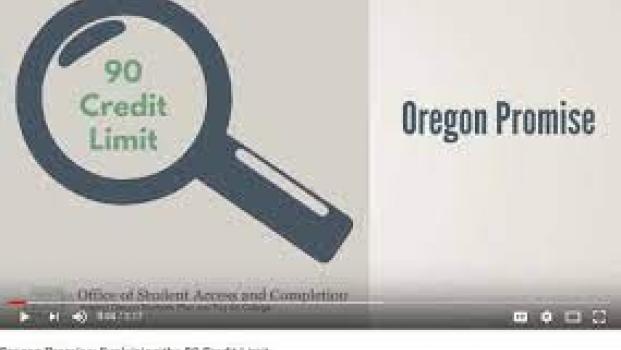Will my College Now credits impact my Oregon Promise?
It could. The Oregon Promise grant will be revoked once you reach an attempted 90 college credits. You can check your cumulative attempted Lane credits on your unoffiical transcript in myLane.
Notes:
- As of Fall 2017, Oregon Promise also has an Estimated Family Contribution (EFC) eligibility range
- Dropping a regular college course is included in the attempted 90 credits
The following video and explanation are copied from Oregon Promise's FAQ:
What does the 90 credit limit include?
This is a limit on the total number of college credits you have attempted. Once you have attempted a total of 90 college credits, you are no longer eligible for Oregon Promise. All of the following types of credits count toward the 90 credit limit:
- College credits you take while in high school or as part of a high school completion program
- College credits you take during summer term*
- College credits you take at another college or university while dual-enrolled at a community college
- College credits for courses you withdraw from or fail
- Advanced Placement (AP) or International Baccalaureate (IB) credits earned
- Any other college credits you attempt or complete prior to and during your time as an Oregon Promise recipient
- *Oregon Promise does not pay for summer courses.
Will my College Now credits impact my financial aid (FAFSA)?
As a student registering for a College Now course, you are attempting college credit. The credit and grade are part of your permanent Lane transcript, which Financial Aid uses to calculate your Satisfactory Academic Progress Standards and how long it will take to complete your program (150% Maximum Attempted Credit). Financial Aid calculates all attempted college credit even though you were in high school and didn’t receive financial aid.
It is important that you enroll in College Now courses purposefully, taking time to consider future college degrees or certificates you may pursue and if your College Now courses will meet the specific degree or certificate requirements (or prerequisites).
You can read more about these policies in the Financial Aid Handbook.
How does repeating a College Now course impact my financial aid (FAFSA)?
Financial Aid Repeat Rule
A standard financial aid rule is that a course may only be funded one more time after you received an initial D- or higher.
If you receive a D- or higher in a College Now course and then want to repeat it through College Now, no matter what the grade is in the repeat, you have used up the repeat funding clause. If you had to take it again at Lane while using financial aid, it would not be calculated into your enrollment level therefore, the 3rd attempt would not be funded.
College Now credits are considered attempted college credits even though you did not receive financial aid at the time.
Example of losing funding for a course before being eligible for financial aid:
- 1st attempt: College Now MTH 111 Spring 2016 earned D- grade
- 2nd attempt: College Now MTH 111 Fall 2016 earned F grade
- You graduate from high school, come to Lane and find out your College Now MTH 111 grade does not meet program requirements
- 3rd attempt: at Lane, course MTH 111 Fall 2017 – no financial aid funds for just this course
- In this situation, if your high school allows you to take MTH 111 a 3rd time, you should do so since College Now courses are no cost to the student.
Example of funding allowed for a repeat:
- 1st attempt: College Now WR 121 Spring 2017 earned D- grade
- You graduate, come to Lane and find out your College Now WR 121 grade does not meet program requirements
- 2nd attempt: at Lane, course WR 121 Fall 2017. Financial aid would fund this repeat and only this repeat regardless of grade earned
Two exception to this rule
- The course is considered “repeatable a specified amount of times” in the course descriptions section in the Lane catalog
- The College Now credit is from another college
